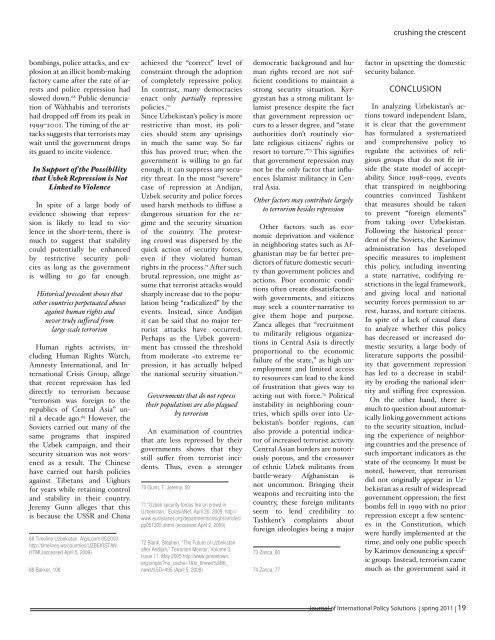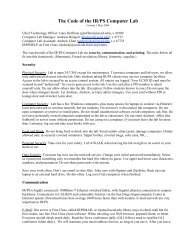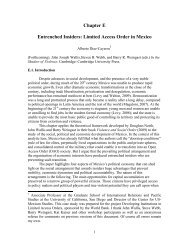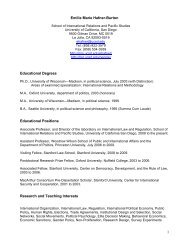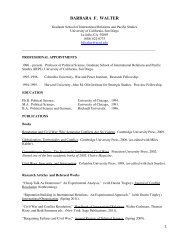to download the full journal. (1.2MB PDF) - School of International ...
to download the full journal. (1.2MB PDF) - School of International ...
to download the full journal. (1.2MB PDF) - School of International ...
You also want an ePaper? Increase the reach of your titles
YUMPU automatically turns print PDFs into web optimized ePapers that Google loves.
crushing <strong>the</strong> crescent<br />
bombings, police attacks, and explosion<br />
at an illicit bomb-making<br />
fac<strong>to</strong>ry came after <strong>the</strong> rate <strong>of</strong> arrests<br />
and police repression had<br />
slowed down. 68 Public denunciation<br />
<strong>of</strong> Wahhabis and terrorists<br />
had dropped <strong>of</strong>f from its peak in<br />
1999–2001. The timing <strong>of</strong> <strong>the</strong> attacks<br />
suggests that terrorists may<br />
wait until <strong>the</strong> government drops<br />
its guard <strong>to</strong> incite violence.<br />
In Support <strong>of</strong> <strong>the</strong> Possibility<br />
that Uzbek Repression is Not<br />
Linked <strong>to</strong> Violence<br />
In spite <strong>of</strong> a large body <strong>of</strong><br />
evidence showing that repression<br />
is likely <strong>to</strong> lead <strong>to</strong> violence<br />
in <strong>the</strong> short-term, <strong>the</strong>re is<br />
much <strong>to</strong> suggest that stability<br />
could potentially be enhanced<br />
by restrictive security policies<br />
as long as <strong>the</strong> government<br />
is willing <strong>to</strong> go far enough.<br />
His<strong>to</strong>rical precedent shows that<br />
o<strong>the</strong>r countries perpetuated abuses<br />
against human rights and<br />
never truly suffered from<br />
large-scale terrorism<br />
Human rights activists, including<br />
Human Rights Watch,<br />
Amnesty <strong>International</strong>, and <strong>International</strong><br />
Crisis Group, allege<br />
that recent repression has led<br />
directly <strong>to</strong> terrorism because<br />
“terrorism was foreign <strong>to</strong> <strong>the</strong><br />
republics <strong>of</strong> Central Asia” until<br />
a decade ago. 69 However, <strong>the</strong><br />
Soviets carried out many <strong>of</strong> <strong>the</strong><br />
same programs that inspired<br />
<strong>the</strong> Uzbek campaign, and <strong>the</strong>ir<br />
security situation was not worsened<br />
as a result. The Chinese<br />
have carried out harsh policies<br />
against Tibetans and Uighurs<br />
for years while retaining control<br />
and stability in <strong>the</strong>ir country.<br />
Jeremy Gunn alleges that this<br />
is because <strong>the</strong> USSR and China<br />
68 Timeline Uzbekistan. Algis.com 05/2003<br />
http://timelines.ws/countries/UZBEKISTAN.<br />
HTML(accessed April 5, 2009)<br />
69 Bakker, 108<br />
achieved <strong>the</strong> “correct” level <strong>of</strong><br />
constraint through <strong>the</strong> adoption<br />
<strong>of</strong> completely repressive policy.<br />
In contrast, many democracies<br />
enact only partially repressive<br />
policies. 70<br />
Since Uzbekistan’s policy is more<br />
restrictive than most, its policies<br />
should stem any uprisings<br />
in much <strong>the</strong> same way. So far<br />
this has proved true; when <strong>the</strong><br />
government is willing <strong>to</strong> go far<br />
enough, it can suppress any security<br />
threat. In <strong>the</strong> most “severe”<br />
case <strong>of</strong> repression at Andijan,<br />
Uzbek security and police forces<br />
used harsh methods <strong>to</strong> diffuse a<br />
dangerous situation for <strong>the</strong> regime<br />
and <strong>the</strong> security situation<br />
<strong>of</strong> <strong>the</strong> country. The protesting<br />
crowd was dispersed by <strong>the</strong><br />
quick action <strong>of</strong> security forces,<br />
even if <strong>the</strong>y violated human<br />
rights in <strong>the</strong> process. 71 After such<br />
brutal repression, one might assume<br />
that terrorist attacks would<br />
sharply increase due <strong>to</strong> <strong>the</strong> population<br />
being “radicalized” by <strong>the</strong><br />
events. Instead, since Andijan<br />
it can be said that no major terrorist<br />
attacks have occurred.<br />
Perhaps as <strong>the</strong> Uzbek government<br />
has crossed <strong>the</strong> threshold<br />
from moderate =<strong>to</strong> extreme repression,<br />
it has actually helped<br />
<strong>the</strong> national security situation. 72<br />
Governments that do not repress<br />
<strong>the</strong>ir populations are also plagued<br />
by terrorism<br />
An examination <strong>of</strong> countries<br />
that are less repressed by <strong>the</strong>ir<br />
governments shows that <strong>the</strong>y<br />
still suffer from terrorist incidents.<br />
Thus, even a stronger<br />
70 Gunn, T. Jeremy, 50<br />
71 “Uzbek security forces fire on crowd in<br />
Uzbekistan,” EurasiaNet, April 20, 2009. http://<br />
www.eurasianet.org/departments/insight/articles/<br />
pp051305.shtml (accessed April 2, 2009)<br />
72 Blank, Stephen, “The Future <strong>of</strong> Uzbekistan<br />
after Andijan,” Terrorism Moni<strong>to</strong>r, Volume 3,<br />
Issue 11. May 2005 http://www.james<strong>to</strong>wn.<br />
org/single/?no_cache=1&tx_ttnews%5Btt_<br />
news%5D=495 (April 5, 2009)<br />
democratic background and human<br />
rights record are not sufficient<br />
conditions <strong>to</strong> maintain a<br />
strong security situation. Kyrgyzstan<br />
has a strong militant Islamist<br />
presence despite <strong>the</strong> fact<br />
that government repression occurs<br />
<strong>to</strong> a lesser degree, and “state<br />
authorities don’t routinely violate<br />
religious citizens’ rights or<br />
resort <strong>to</strong> <strong>to</strong>rture.” 73 This signifies<br />
that government repression may<br />
not be <strong>the</strong> only fac<strong>to</strong>r that influences<br />
Islamist militancy in Central<br />
Asia.<br />
O<strong>the</strong>r fac<strong>to</strong>rs may contribute largely<br />
<strong>to</strong> terrorism besides repression<br />
O<strong>the</strong>r fac<strong>to</strong>rs such as economic<br />
deprivation and violence<br />
in neighboring states such as Afghanistan<br />
may be far better predic<strong>to</strong>rs<br />
<strong>of</strong> future domestic security<br />
than government policies and<br />
actions. Poor economic conditions<br />
<strong>of</strong>ten create dissatisfaction<br />
with governments, and citizens<br />
may seek a counter-narrative <strong>to</strong><br />
give <strong>the</strong>m hope and purpose.<br />
Zanca alleges that “recruitment<br />
<strong>to</strong> militarily religious organizations<br />
in Central Asia is directly<br />
proportional <strong>to</strong> <strong>the</strong> economic<br />
failure <strong>of</strong> <strong>the</strong> state,” as high unemployment<br />
and limited access<br />
<strong>to</strong> resources can lead <strong>to</strong> <strong>the</strong> kind<br />
<strong>of</strong> frustration that gives way <strong>to</strong><br />
acting out with force. 74 Political<br />
instability in neighboring countries,<br />
which spills over in<strong>to</strong> Uzbekistan’s<br />
border regions, can<br />
also provide a potential indica<strong>to</strong>r<br />
<strong>of</strong> increased terrorist activity.<br />
Central Asian borders are no<strong>to</strong>riously<br />
porous, and <strong>the</strong> crossover<br />
<strong>of</strong> ethnic Uzbek militants from<br />
battle-weary Afghanistan is<br />
not uncommon. Bringing <strong>the</strong>ir<br />
weapons and recruiting in<strong>to</strong> <strong>the</strong><br />
country, <strong>the</strong>se foreign militants<br />
seem <strong>to</strong> lend credibility <strong>to</strong><br />
Tashkent’s complaints about<br />
foreign ideologies being a major<br />
73 Zanca, 80<br />
74 Zanca, 77<br />
fac<strong>to</strong>r in upsetting <strong>the</strong> domestic<br />
security balance.<br />
CONCLUSION<br />
In analyzing Uzbekistan’s actions<br />
<strong>to</strong>ward independent Islam,<br />
it is clear that <strong>the</strong> government<br />
has formulated a systematized<br />
and comprehensive policy <strong>to</strong><br />
regulate <strong>the</strong> activities <strong>of</strong> religious<br />
groups that do not fit inside<br />
<strong>the</strong> state model <strong>of</strong> acceptability.<br />
Since 1998–1999, events<br />
that transpired in neighboring<br />
countries convinced Tashkent<br />
that measures should be taken<br />
<strong>to</strong> prevent “foreign elements”<br />
from taking over Uzbekistan.<br />
Following <strong>the</strong> his<strong>to</strong>rical precedent<br />
<strong>of</strong> <strong>the</strong> Soviets, <strong>the</strong> Karimov<br />
administration has developed<br />
specific measures <strong>to</strong> implement<br />
this policy, including inventing<br />
a state narrative, codifying restrictions<br />
in <strong>the</strong> legal framework,<br />
and giving local and national<br />
security forces permission <strong>to</strong> arrest,<br />
harass, and <strong>to</strong>rture citizens.<br />
In spite <strong>of</strong> a lack <strong>of</strong> causal data<br />
<strong>to</strong> analyze whe<strong>the</strong>r this policy<br />
has decreased or increased domestic<br />
security, a large body <strong>of</strong><br />
literature supports <strong>the</strong> possibility<br />
that government repression<br />
has led <strong>to</strong> a decrease in stability<br />
by eroding <strong>the</strong> national identity<br />
and stifling free expression.<br />
On <strong>the</strong> o<strong>the</strong>r hand, <strong>the</strong>re is<br />
much <strong>to</strong> question about au<strong>to</strong>matically<br />
linking government actions<br />
<strong>to</strong> <strong>the</strong> security situation, including<br />
<strong>the</strong> experience <strong>of</strong> neighboring<br />
countries and <strong>the</strong> presence <strong>of</strong><br />
such important indica<strong>to</strong>rs as <strong>the</strong><br />
state <strong>of</strong> <strong>the</strong> economy. It must be<br />
noted, however, that terrorism<br />
did not originally appear in Uzbekistan<br />
as a result <strong>of</strong> widespread<br />
government oppression; <strong>the</strong> first<br />
bombs fell in 1999 with no prior<br />
repression except a few sentences<br />
in <strong>the</strong> Constitution, which<br />
were hardly implemented at <strong>the</strong><br />
time, and only one public speech<br />
by Karimov denouncing a specific<br />
group. Instead, terrorism came<br />
much as <strong>the</strong> government said it<br />
Journal <strong>of</strong> <strong>International</strong> Policy Solutions | spring 2011 | 19


